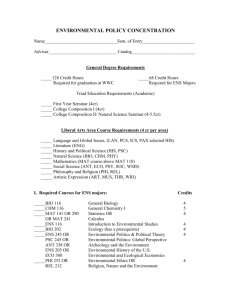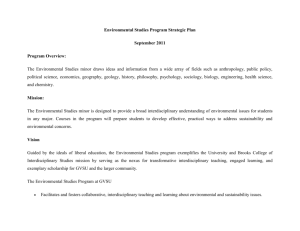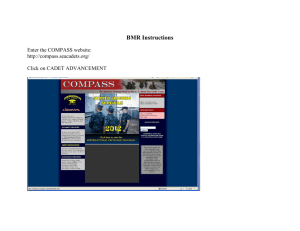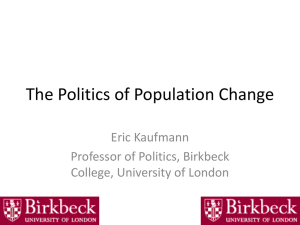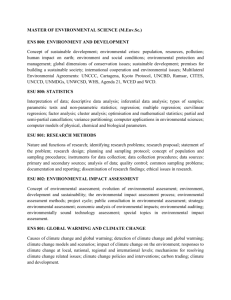ENS 116 – Introduction to Environmental Studies 4cr
advertisement
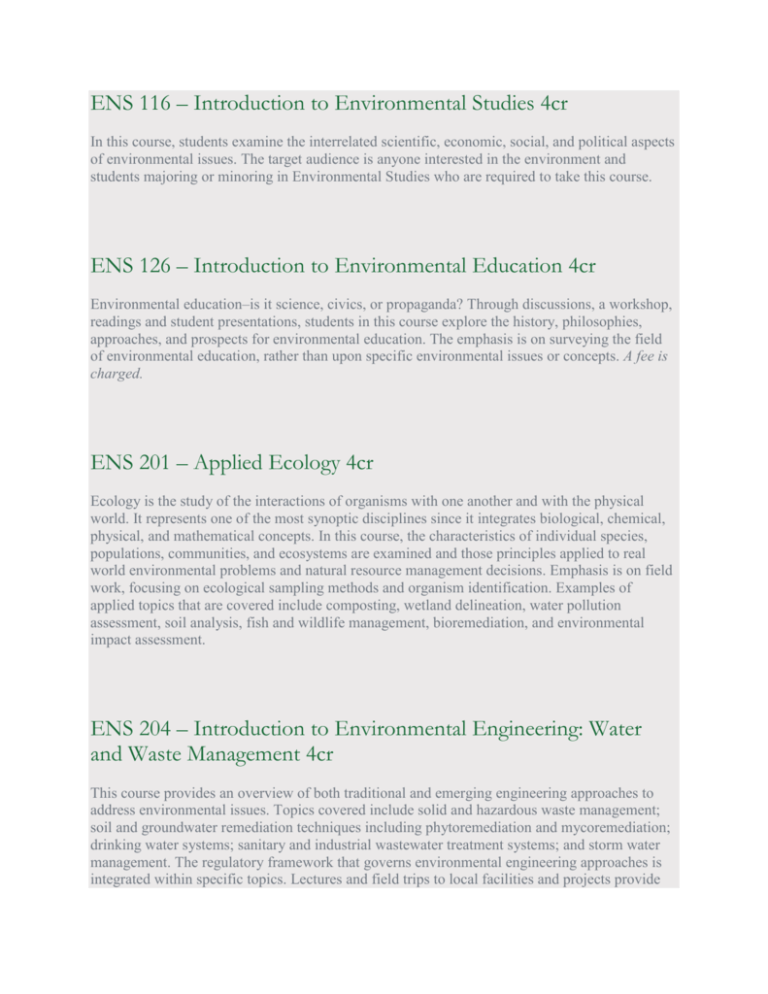
ENS 116 – Introduction to Environmental Studies 4cr In this course, students examine the interrelated scientific, economic, social, and political aspects of environmental issues. The target audience is anyone interested in the environment and students majoring or minoring in Environmental Studies who are required to take this course. ENS 126 – Introduction to Environmental Education 4cr Environmental education–is it science, civics, or propaganda? Through discussions, a workshop, readings and student presentations, students in this course explore the history, philosophies, approaches, and prospects for environmental education. The emphasis is on surveying the field of environmental education, rather than upon specific environmental issues or concepts. A fee is charged. ENS 201 – Applied Ecology 4cr Ecology is the study of the interactions of organisms with one another and with the physical world. It represents one of the most synoptic disciplines since it integrates biological, chemical, physical, and mathematical concepts. In this course, the characteristics of individual species, populations, communities, and ecosystems are examined and those principles applied to real world environmental problems and natural resource management decisions. Emphasis is on field work, focusing on ecological sampling methods and organism identification. Examples of applied topics that are covered include composting, wetland delineation, water pollution assessment, soil analysis, fish and wildlife management, bioremediation, and environmental impact assessment. ENS 204 – Introduction to Environmental Engineering: Water and Waste Management 4cr This course provides an overview of both traditional and emerging engineering approaches to address environmental issues. Topics covered include solid and hazardous waste management; soil and groundwater remediation techniques including phytoremediation and mycoremediation; drinking water systems; sanitary and industrial wastewater treatment systems; and storm water management. The regulatory framework that governs environmental engineering approaches is integrated within specific topics. Lectures and field trips to local facilities and projects provide the contextual foundation. Activities include field and laboratory measurement of environmental parameters typically utilized in environmental engineering projects. Case studies are analyzed. Students taking this course must be prepared to be active participants rather than innocent bystanders. ENS 220 – Environmental Attitudes, Values and Behavior 2cr This course explores the relationships among attitudes, values, and behaviors towards the natural and built environments. These issues are examined from the macro level of cultural and historical context and from the micro level of psychological processes. Readings draw from a wide range of psychological perspectives, including social psychology, cognitive psychology, behavioral therapy, psychodynamic perspectives, environmental psychology, and ecopsychology. Applications to personal, local, regional, national, and global environmental issues are emphasized. A companion course (PSY 416 Ecopsychology) is taught in a subsequent term. This course meets elective requirements for majors in Environmental Studies and Psychology. Prerequisite: PSY 100 Introduction to Psychology or ENS 116 Introduction to Environmental Studies. ENS 227 – Geology of the Southern Appalachians 2cr This course is designed to help students gain an understanding of the geologic processes that formed the local environment. There are four field trips in which students observe the geologic environment of the southern Appalachians. There is one evening meeting during the first week TBA, and four meeting times on Saturdays. ENS 228 – Geology of National Parks 2cr Topics in this course focus on the geologic context of North America through study of representative national parks. Field trips visit several local parks. ENS 229 – Environmental Geology 4cr This course covers the geologic conditions that impact development in the area. Topics include landslides, water resources, groundwater pollution, and rural/urban development. ENS 230 – Geology 4cr This course provides an overview of earth materials and processes such as planet formation, plate tectonics, landscape development, and rock formation. Exercises include map studies and rock and mineral classification. Although primary emphasis is placed on physical geology and the interpretation of geologic processes, an introduction to historical geology is also provided. A three hour lab period is included every other week. Natural Science ENS 233 – Forest Biology 4cr This course focuses on the patterns and processes that make forested ecosystems unique biological communities. Topics for examination include forest structure, composition and dynamics, and biotic/abiotic interactions at the species, stand, and landscape levels. The emphasis is on temperate forest systems of North America, especially those of the Southern Appalachians. Students spend considerable time in the field both during class periods and on their own learning woody plant identification and understanding the ecological context in which different species grow. The course serves as the foundation for the Sustainable Forestry Concentration in Environmental Studies and is a prerequisite for ENS 334 Silviculture and ENS 333 Introduction to Forest Management. Prerequisite: BIO 116 General Biology. ENS 245 – Environmental Politics and Political Theory 4cr This course investigates the various perspectives through which contemporary people view the relationship between human and non-human worlds. These alternative approaches define the parameters within which “acceptable” policy alternatives are debated and adopted. Environmental perspectives and policy options ranging from cornucopian free-market growth to deep ecology and ecofeminism are investigated and critically analyzed. The goal is to help students become informed, rational, ethical judges of the competing claims of the eight major perspectives that join environmental politics and political theory. Prerequisite: ENS 116 Introduction to Environmental Studies. ENS 248 – Community Organizing for Sustainable Living 4cr Community organizing is a process by which people are brought together to act in a common interest. Sustainable living has been defined as a lifestyle that could be sustained for many generations without exhausting natural resources. This course helps students organize and communicate their knowledge and concern about sustainable living to diverse stakeholders. Students design, implement, and evaluate an environmental campaign promoting sustainable behaviors on the WWC campus. ENS 249 – Introduction to Sustainable Agriculture 4cr This course explores the sustainability of contemporary farming systems through a study of the history of food production in the United States as it relates to the development of ecological agriculture. Students learn about the rise of industrial and ecological forms of U.S. agriculture in the 20th century and consider the ethical, economic, ecological, and social dimensions of agricultural sustainability. The principles and practices of four distinctive methods of ecological agriculture – certified organic, biodynamic, biointensive, and permaculture – are investigated as examples of systems of food production that may be sustainable. Prerequisite: ENS 116 Introduction to Environmental Studies. ENS 302 – Aquatic Ecology and Water Pollution 4cr This course presents the principles by which aquatic systems are organized and emphasizes the manner in which representative aquatic ecosystems function. Ecological theory relating to energy flow and matter cycling is a major topic as is studies of the adaptations for life in different types of aquatic systems. The second half of the course focuses on water pollution sources, effects, detection, and control. One major weekend field trip with a fee of $20 is required. A three-hour lab period is included every week. Prerequisites: BIO 116 General Biology and CHM 116 General Chemistry I. ENS 303 – Hydrology 4cr This course is a study of hydrologic conditions and principles relevant to environmental science. There is a strong field focus. Prerequisites: CHM 116 General Chemistry I. ENS 310 – Conservation and Wildlife Biology 4cr Conservation biology is the applied science of maintaining the earth’s biological diversity. The main focus of this course is biological, but it is cross-disciplinary and reaches into philosophy, economics, and sociology. Game, non-game, endangered species, and principles of wildlife management are included. Prerequisites: BIO 116 General Biology and BIO 202 Ecology. ENS 330 – Soil Science 4cr This course introduces soil as a natural body of critical importance to sustainable natural resource use. Students explore factors influencing soil development and investigate the impact of soil physical, chemical, and biological properties on ecosystem health and human well-being. Students gain experience in the identification of common soil characteristics in the field, practice the use of soil survey information in natural resource management and perform standard soil laboratory analyses. Specific soil management topics such as managing soils for agriculture, forestry, or urban uses are used as examples of general concepts but are not a main focus of this course. Prerequisites: CHM 116 General Chemistry I and ENS 116 Introduction to Environmental Studies. ENS 333 – Introduction to Forest Management 4cr This course provides an introduction to forest management policy and decision-making processes. mphasis is on multiple-use management. Students learn to develop management plans to meet multiple objectives that best use diverse forest resources. A three-hour lab period is included every other week. Prerequisite: ENS 233 Forest Biology. ENS 334 – Silviculture 4cr Students examine the many silvicultural systems used in the United States with emphasis on the eastern U.S. forests. Each system is compared and analyzed with regard to silvics of the most important species, economics, management objectives, and environmental protection. A threehour lab period is included every other week. Prerequisite: ENS 233 Forest Biology. ENS 421 – Environmental Policy 4cr This course is a broad survey of the public policy process focusing on environmental policy as it is formulated at the federal level of government in the United States. The course is divided into three parts: an analysis of the policy process using the policy cycle model, an investigation of two case studies of important environmental issues (which vary from year to year), and individual student research on a particular policy concern culminating in the writing of a major research paper. College Composition II Prerequisites: ENS 116 Introduction to Environmental Studies and PSC 151 Introduction to American Government. ENS 425 – Sustainable Development and the Politics of Growth 4cr Because “sustainable development” is often cited as the goal of environmental policy, this course attempts to discover exactly what is meant by sustainable development. Issues of economic incentives are analyzed. Unlike a standard course in environmental policy that focuses on the formulation and implementation of statutory law at the federal level of the American government, this course emphasizes economic, theoretical, and international issues. ENS 426 – Methods and Materials in Environmental Education 4cr The goal of this course is to give students experience, competence, and confidence as environmental educators. Students examine environmental education curriculum materials, try out various teaching methods, and discuss how the objectives of environmental education can be translated into programs and activities. Several teaching sessions in local schools and other educational settings are arranged. Prerequisites: Permission of instructor and ENS 126 Introduction to Environmental Education. ENS 431 – Toxicology 2cr Toxicology is the study of the adverse effects of xenobiotic agents. This senior level course introduces the basic principles of biochemical toxicology. Emphasis is placed upon the impact of environmental pollution on humans and wildlife. This course requires two examinations, one presentation and one 5-page paper. Additional readings are assigned throughout the course. Prerequisites: CHM 116 General Chemistry I, CHM 117 General Chemistry II, and BIO 116 General Biology. ENS 432 – Epidemiology 2cr Epidemiology is the study of disease distribution within populations and what affects this distribution. Epidemiologists have progressed from examining infectious diseases in the late 1800s to modern studies of obesity, lead exposure, and even cell phone use. Our world is a healthier and safer place because of this discipline. This course consists of two sections: first, a series of lectures and readings introduce the principles of epidemiology; second, newfound knowledge is used to develop and implement a study on campus. The first section of this course demands considerable out-of-class reading and study. Prerequisite: MAT 141 Statistics. ENS 440 – Sustainable Farm Management 4cr This course introduces the principles and practices of sustainable farm management using a whole farm planning perspective and adaptive management strategies. Students develop an understanding of sustainable farm management at the individual farm scale by completing a fiveyear start-up plan for a new farm business using whole farm planning principles: goal setting, resource assessment, enterprise analysis, goal-directed crop and livestock production, and marketing and monitoring system performance with sustainability indicators. Prerequisites: ENS 249 Introduction to Sustainable Agriculture and ENS 341 Agroecology, or permission of instructor. ENS 451 – Community and Land Use Planning 4cr This course addresses theoretical and practical aspects of land use planning at the local level. The terms “community” and “citizenship” are analyzed in their modern and historical contexts. Students investigate various concepts and techniques used by state, regional, urban, and rural planning organizations. Topics such as historic preservation, public lands, and conservation partnerships are discussed. Prerequisites: Junior standing, PSC 151 Introduction to American Government, and ENS 116 Introduction to Environmental Studies. ENS 470-476 – Topics in Conservation Biology 2cr These rotating courses address timely and current issues in conservation biology. Different subjects are taught in different terms. Students explore the topic within the field of conservation biology and learn how the principles of conservation biology are applied to the topic and used in conservation on the ground. These courses combine the theoretical knowledge students gain in conservation and wildlife biology and applied work in conservation. May be repeated for credit as long as the topic has changed. ENS 479 – Advanced Conservation Biology Seminar 4cr This course explores the primary literature in the conservation biology field. Students study important foundational articles as well as cutting edge research in the field of conservation biology. Topics covered may include animal behavior and conservation, conservation genetics, population viability analysis, management plans, biodiversity hotspots, fragmentation, and impacts of climate change. Students develop a presentation using primary literature to communicate current conservation research with a high school or middle school audience. Prerequisite: ENS 310 Conservation and Wildlife Biology. ENS 484 – Environmental Education Internship Seminar 1cr This seminar focuses on helping students identify placement sites for a concentration in environmental education that will meet their personal and professional goals, prepare their proposals, and determine appropriate projects completed during the internship. The seminar helps students prepare for their internship experience by hearing from other students who have completed an internship. Prerequisite: ENS 116 Introduction to Environmental Studies or permission of instructor. ENS 485 – Environmental Studies Internship 2-16cr The Environmental Studies Internship offers students majoring or minoring in Environmental Studies the opportunity to apply their course work in an off-campus situation. Required paperwork needs to be completed before the internship. Students need to plan for this experience at least 10 weeks in advance. Work is supervised by a Warren Wilson faculty member in Environmental Studies and by a staff member in the organization with which the student is placed. A follow-up project is required. Prerequisites: Application to the organization and an interview with the faculty sponsor at least ten weeks prior to the beginning of the proposed internship. PHI 252 – Environmental Ethics 4cr The central focus of this course is to develop an understanding of the proper relationship between humans and the non-human entities of the natural world. In so doing, the course explores the major Western approaches to environmental ethics and the central issues of the ethical status of plants and animals, the holism/individualism debate and the meaning of sustainability. A significant portion of this course is devoted to the Land Ethic, Deep Ecology, Ecofeminism and some Eastern approaches as well. This course fulfills the “Diverse Perspectives Requirement” within the Philosophy Program. A substantial part of its content includes diverse perspectives in terms of gender, race, ethnicity, and/or sexual orientation. At least one writing assignment includes one or more of these perspectives. SOC 271 -Environmental Sociology 4cr This course focuses on the interrelationship between natural and social environments. Although the course covers a broad range of issues, emphasis will be given to the development of environmental sociology; various perspectives in environmental sociology; environment and culture; environmental justice; the interrelationship of ideology, materialism, and the environment; global environmental issues; and environmental activism. Satisfies requirement for the Sociology Concentration. WRI 220 – Writing About Place 4cr Students develop a heightened awareness of their environment in this course through reading, writing, and experiencing their immediate surroundings in the Swannanoa Valley. Students read classic and current nature writing, one of the liveliest genres of nonfiction. Weekly writing assignments may culminate in a Journal of Place, a multimedia representation of local findings, or longer narratives that interweave personal stories with stories of the land. REL 213 – Religion and Environmental Justice 4cr This course explores the ethical responsibilities of people who work to ameliorate environmental degradation as well as end oppression of human beings. Students explore the religious tenets of environmental justice movements internationally and in the United States. Course topics focus on Theravada Buddhism in Thailand, indigenous East African beliefs in Kenya, Catholic social teachings in the United States farmworkers’ movement, and black liberation theology in the United States movement against toxic waste dumping in politically marginalized communities. Finally, students gain understanding of the cultural symbols and negotiated relationships that are critical for successfully countering environmental degradation in complicated political contexts. PAX 327 – Environmental Justice: Peace or Conflict 4cr This course deals with the differing ways that human societies historically have interacted with and impacted on their natural environments so as either to intensify inequality and conflict leading in some cases to war and extinction or to achieve longterm environmental justice and peace. Case studies of societies of varying sizes, levels of technology, geographical locations, and time periods are examined. WRI 320 – Environmental Writing 4cr In this course, students read and write pieces that can be categorized along a continuum extending from nature writing to environmental journalism, from radio essays to literary expositions. A strong emphasis is placed on the students’ use in their writing assignments of information gained from careful observation and research. The class is visited by environmental writers who share their experience and insights in the field. Students collectively practice their editorial skills in crafting selected work for submission for publication.
